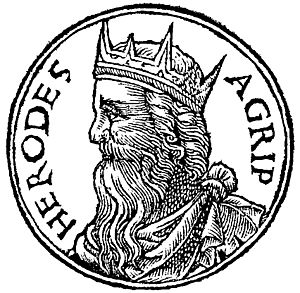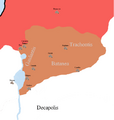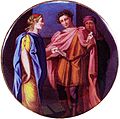Herod Agrippa facts for kids
Quick facts for kids Herod Agrippa I |
|||||
|---|---|---|---|---|---|
 |
|||||
| King of Judaea | |||||
| Reign | AD 41–44 | ||||
| Predecessor | Marullus (Prefect of Judea) | ||||
| Successor | Cuspius Fadus (Procurator of Judea) | ||||
| Born | 11 BC | ||||
| Died | AD 44 (aged 54) Caesarea Maritima |
||||
| Spouse | Cypros, daughter of Phasael, son of Tetrarch Phasael (brother of Herod the Great) | ||||
| Issue | Agrippa II Berenice Mariamne Drusilla |
||||
|
|||||
| Dynasty | Herodian Dynasty | ||||
| Father | Aristobulus IV | ||||
| Mother | Berenice | ||||
Herod Agrippa (also known as Agrippa I) was a powerful Jewish king who ruled Judea from AD 41 to 44. He was the grandson of Herod the Great, a famous king, and the father of Herod Agrippa II, who was the last king from their family, the Herodian Dynasty.
Agrippa grew up in Ancient Rome and became friends with important Roman princes, including Claudius, who later became emperor. After some difficult times and financial struggles, Agrippa returned to Rome and became close to the future emperor Caligula. When Caligula became emperor, he gave Agrippa control over several territories, making him a king.
Later, Agrippa played a key role in helping Claudius become emperor after Caligula was assassinated. As a reward, Claudius gave Agrippa even more land, making his kingdom as large as his grandfather Herod the Great's had been. Agrippa tried to balance his Jewish heritage with his Roman connections. He worked to protect Jewish people's rights within the Roman Empire. He died suddenly in AD 44. His death is mentioned in the Acts of the Apostles in the Bible.
Contents
Life of King Agrippa I
Early Life and Royal Connections
Family Background
Agrippa was born around 11 or 10 BC. His father was Aristobulus IV, one of the sons of Herod the Great, the king of Judea. His mother was Berenice, whose mother was Salome, Herod the Great's sister. This means Herod the Great was both Agrippa's grandfather and his great-uncle.
Agrippa's family was very important. They were connected to both the Hasmonean Dynasty, an older Jewish royal family, and the Herodian Dynasty, which Herod the Great founded.
Growing Up in Rome
When Agrippa was young, around 5 BC, he was sent to the imperial court in Rome. He lived there with his mother and siblings. He was supported by important Roman women, including Antonia Minor, who was the mother of the future emperor Claudius. Agrippa grew up alongside members of the Roman imperial family, like Claudius and Drusus, the son of Emperor Tiberius.
Agrippa became very close friends with Drusus. He lived a luxurious life in Rome, spending a lot of money. However, when Drusus died in AD 23, Agrippa lost his main connection to the imperial family. He also faced many debts and had to leave Rome.
Challenges and Return to Power
Struggles in Judea
After leaving Rome, Agrippa returned to Judea. He lived a much simpler life with his wife, Cypros. They had a son named Agrippa.
Agrippa's wife was related to Herodias, who was married to Herod Antipas, the ruler of Galilee. Herodias helped Agrippa by getting Antipas to give him money and a job in the city of Tiberias. However, Agrippa soon found this life boring and argued with Antipas. He then decided to try his luck again in Rome.
Back to Rome and New Friends
Agrippa managed to borrow money to travel back to Rome in AD 36. Emperor Tiberius welcomed him, but then learned about Agrippa's debts. Luckily, Antonia Minor helped Agrippa pay off his debts, and he regained the emperor's favor.
Tiberius asked Agrippa to look after his grandson, Tiberius Gemellus. Agrippa also became very good friends with Caligula, another important prince and future emperor. Agrippa spent a lot of money to gain Caligula's friendship.
One day, Agrippa made a risky comment, wishing that Tiberius would die soon so Caligula could become emperor. This was reported to Tiberius, and Agrippa was arrested. However, he was held in comfort because he was friends with Caligula.
Becoming King
When Tiberius died on March 16, AD 37, Caligula became emperor. Caligula immediately released Agrippa and gave him a gold chain as heavy as the one he wore in prison. More importantly, Caligula made Agrippa a king! He gave him control over the territories that had belonged to Philip the Tetrarch, located northeast of the Sea of Galilee.
Agrippa returned to his new kingdom in AD 38. His sister, Herodias, and her husband, Herod Antipas, became jealous of Agrippa's royal title. Herodias urged Antipas to go to Rome and ask Caligula to make him a king too. Agrippa found out and sent a message to Caligula, accusing Antipas of plotting against the emperor. Caligula believed Agrippa and exiled Antipas. As a result, Agrippa received Antipas's territories, Galilee and Perea.
Agrippa's Influence and Challenges
The Statue in Jerusalem
A big problem arose when Emperor Caligula decided to place a statue of himself in the Temple of Jerusalem. This was a huge insult to Jewish people, as their religion forbids worshipping statues, especially in their holiest place. The Roman governor of Syria, Publius Petronius, was ordered to carry out this plan, even if it meant using force. Jewish people throughout the region were very upset and prepared to revolt.
Agrippa was in Rome during this time. He was torn between his loyalty to the emperor and his Jewish faith. He bravely decided to speak to Caligula, asking him not to put the statue in the Temple. Agrippa reminded the emperor of all the good things he had done for him but explained that this act would deeply upset his Jewish people.
Caligula seemed to listen to Agrippa and ordered Petronius to stop the plan. However, the emperor later changed his mind. Luckily, Caligula was assassinated on January 24, AD 41, which finally ended the threat to the Temple.
Helping Claudius Become Emperor
After Caligula's death, there was confusion in Rome about who would rule next. Some people wanted to bring back the old Roman Republic. However, Agrippa played a very important role in helping Claudius, Caligula's uncle and Agrippa's childhood friend, become the new emperor.
Agrippa helped the Praetorian Guard (the emperor's personal soldiers) find Claudius, who was hiding. He then convinced the soldiers to declare Claudius emperor. Agrippa also acted as a go-between for Claudius and the Roman senators, persuading the senators to accept Claudius as the new ruler.
A Larger Kingdom
Because of Agrippa's help, Emperor Claudius rewarded him greatly. Agrippa's kingdom grew even bigger, including Judea, Idumea, and Samaria. This meant Agrippa now ruled over a territory as vast as his grandfather, Herod the Great, had. Claudius also gave Agrippa special honors in Rome.
Agrippa then returned to Judea to rule his enlarged kingdom. He tried to make both his Jewish and non-Jewish subjects happy. He also started rebuilding the walls of Jerusalem, which gave many Jewish people hope for a more independent kingdom. He also funded impressive buildings in other cities, like Berytus.
Agrippa was known for being a very religious man. He showed respect for Jewish traditions and was praised by Jewish religious leaders. He also had the power to appoint the high priests of the Temple.
Death and Legacy
Regional Tensions
Agrippa's growing power made some Roman officials nervous. Marsus, the Roman governor of Syria, was particularly wary of him. Marsus sent letters to Claudius, expressing his concerns about Agrippa's influence.
Marsus even stopped Agrippa from building up Jerusalem's defenses. He also broke up a meeting Agrippa had with several other kings in Tiberias, fearing it was a plot against Rome.
Agrippa's Death
Agrippa died suddenly in AD 44, after ruling Judea for only three years. He was attending games in Caesarea Maritima held in honor of the emperor. He appeared in a dazzling silver robe, and the crowd cheered, comparing him to a god. The Bible's Acts of the Apostles says that because Agrippa did not reject this praise, an angel struck him down, and he died a few days later from a severe illness. Historians believe he might have been poisoned, possibly by those who feared his growing power.
Agrippa's death was a cause for celebration among some non-Jewish people in his kingdom, especially in Caesarea. However, for many Jewish people, his death meant the end of their hopes for a more independent Jewish state.
Family and Descendants
Agrippa and his wife Cypros had four children who lived to adulthood: a son named Agrippa, and three daughters named Berenice, Mariamne, and Drusilla.
- Agrippa II (born AD 27/28) was raised in Rome. He did not immediately succeed his father as king of Judea. Later, he received other territories and became an important figure, often helping the Romans. He sided with the Romans during the Great Jewish Revolt (AD 66-70). He had no children.
- Berenice (born AD 28) married Marcus Julius Alexander, but he died young. She then married her uncle, Herod of Chalcis. After his death, she married another king, Marcus Antonius Polemo II, who converted to Judaism for her. However, she later left him and became famous for her relationship with the Roman general and future emperor Titus.
- Mariamne (born AD 34/35) married Julius Archelaus and later divorced him. She then married Demetrius of Alexandria, a very wealthy Jewish leader.
- Drusilla (born around AD 38) was first supposed to marry a prince named Gaius Epiphanes, but he refused to convert to Judaism. She then married Gaius Julius Azizus, King of Emesa. However, she left him to marry the Roman governor of Judea, Antonius Felix. They had a son named Agrippa, who died during the eruption of Mount Vesuvius in AD 79.
Agrippa in Stories and Media
Herod Agrippa has appeared in various works of art and literature:
- He is the main character in an Italian opera from 1724 called L’Agrippa tetrarca di Gerusalemme.
- He is an important character in Robert Graves' novel Claudius the God and the TV show I, Claudius. In these stories, he is shown as a close friend and advisor to Emperor Claudius.
Images for kids
-
Berenice and her brother Agrippa II in a stained glass window.
-
Painting of Titus and Berenice.
See also
 In Spanish: Herodes Agripa I para niños
In Spanish: Herodes Agripa I para niños
- Herodian dynasty
- Herodian kingdom
- List of biblical figures identified in extra-biblical sources
- 1st century in Lebanon
- List of Hasmonean and Herodian rulers
 | Emma Amos |
 | Edward Mitchell Bannister |
 | Larry D. Alexander |
 | Ernie Barnes |













